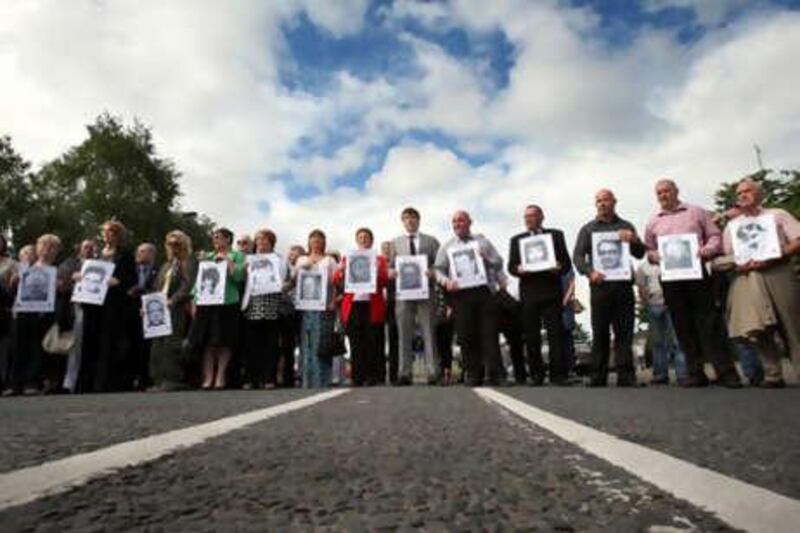Britain is due to publish the long-awaited findings of a probe into the killings of 13 people on Bloody Sunday, a key flashpoint in three decades of unrest in Northern Ireland. Relatives of those who died when British troops opened fire at a civil rights march in Londonderry in 1972 were among the first to see the report, the result of the longest and most expensive probe in British legal history.
Hours before the report's publication at 3.30pm local time, campaigners gathered to symbolically complete the march halted by the killings 38 years ago, while a public parade was also scheduled. The report examines the events of January 30, 1972 in Northern Ireland's second city, when 13 men were shot dead by British soldiers at the march. Others were injured and a 14th man died later from his wounds.
It was a landmark incident in The Troubles - the three decades of violence in which more than 3,500 people died and which were largely ended by the 1998 Good Friday Agreement. The inquiry took 12 years and cost more than £190million (Dh1, 029m) to produce. It is intended to paint a full, true picture of what happened on Bloody Sunday more than 38 years ago in Londonderry, known as Derry to Catholics.
Families are notably hoping that it will find that none of the dead or wounded people were gunmen or bombers. Mickey McKinney, whose 27-year-old brother Willie was shot dead on the day, said the British army and government must be held to account. "We want the truth - a declaration of innocence and a recommendation that those responsible are prosecuted," he said. "If I know justice has been done, I'll be able to move on and know I did my best."
The 5,000-page report was given to the British government on Monday, and prime minister David Cameron will make a statement on its findings in the House of Commons in London at 3.30pm local time today. The inquiry, headed by senior judge Mark Saville, was launched by former prime minister Tony Blair's Labour government as Northern Ireland's peace process built momentum. The inquiry heard from more than 900 witnesses and received statements from around 2,500 people. The evidence ran to an estimated 20-30 million words.
Among the witnesses was Northern Ireland's deputy first minister Martin McGuinness, who admitted that he was an Irish Republican Army (IRA) paramilitary commander in Londonderry at the time. "The citizens of Derry, to a man and woman, want Saville to make it absolutely clear that the 27 people who were shot on that day - murdered and injured - were completely innocent people and that those people who inflicted those deaths and injuries were the guilty parties," Mr McGuinness said on Monday.
An initial inquiry held in the weeks after Bloody Sunday largely exonerated the British paratroopers, saying that their firing "bordered on the reckless". Some have expressed concerns that, while the new report might trigger calls for soldiers to be prosecuted, many paramilitary murders remain unaccounted for and paramilitary prisoners have been freed under the terms of Northern Ireland's peace accords.
Senior British army officers who served in Northern Ireland have said that if soldiers stand trial, then prominent IRA figures of the time should also face prosecution. On the streets of Londonderry there was a sombre mood today, ahead of the report's publication. Seventy-one-year-old Wilfred Brown, who was a steward on the march and has lived in the city for 42 years, said the report "brings back a lot of memories of people getting shot for nothing."
"They shouldn't have opened up," he said, standing in front of the Bloody Sunday memorial on Londonderry's Rossville Street, adding: "I hope there is no trouble." * AFP






